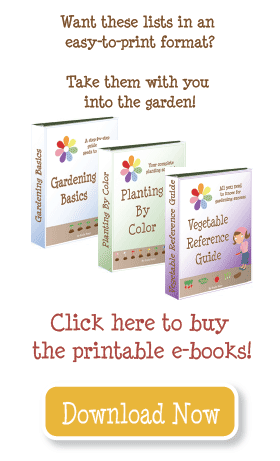| Spring Color | Dates | Spring Color | Dates |
|---|---|---|---|
| White Group | December 28-January 3 | Yellow Group | February 22-28 |
| Pink Group | January 11-17 | Green Group | March 8-14 |
| Red Group | January 25-31 | Blue Group | March 22-28 |
| Orange Group | February 8-14 | Violet Group | April 5-11 |
To Do This Week
| Start Seeds Inside | Transplant Plants | Plant Seeds Outside |
|---|---|---|
| Broccoli Cabbage Cauliflower Chives Collard greens Kale Mustard greens Onions (from seed) Parsley Rosemary Swiss chard |
Peas* | |
| *New plant! This was added since the previous week. | ||
If you haven’t been starting seeds indoors, chances are you haven’t been thinking about gardening yet. Now it’s time! The earliest vegetables can be planted as soon as you can work the soil, which should be happening soon. If you haven’t already done so, create a plan and prepare your garden beds.
Plan
- Decide what veggies you want to plant, and how much of each.
- Create a garden plan! Use the tool linked here, or draw out your garden on paper, mapping out where each type of plant will go.
Prepare
- Complete an inventory and create a list of items you need
for your garden.
- Purchase seeds
, onion sets, compost, and any other equipment you need
.
- Prepare soil by adding compost and/or other amendments, till or turn it.
- Set up trellises
and other supports
for spring vegetables.
Broccoli
Broccoli is a hardy vegetable that grows best in cool temperatures. In most areas there is not enough time to grow broccoli from seeds before the weather gets too hot. Start seeds indoors or purchase transplants in a few weeks.
Cabbage
Cabbage is a hardy vegetable that grows best in cool temperatures. In most areas there is not enough time to grow cabbage from seeds before the weather gets too hot. Start seeds indoors or purchase transplants in a few weeks.
Cauliflower
Cauliflower is a very temperamental vegetable to grow. It cannot tolerate extreme heat or cold. Start seeds indoors or purchase transplants in a few weeks.
Chives
Chives are a cool-season herb. Start seeds indoors, and transplant it once it’s a little warmer, or simply purchase transplants at that time.
Collard Greens
Collard greens are more heat tolerant than many other vegetables in the cabbage family. Still, they prefer cool weather. Start seeds indoors and transplant it later in the season to extend the harvest of these greens.
Kale
Kale is a hardy vegetable that grows best in cool weather. Start seeds indoors or purchase transplants in a few weeks. If you live in a climate with hot summers and/or a short fall, choose varieties that mature quickly.
Mustard Greens
Mustard greens prefer cool weather. Start seeds indoors and transplant it later in the season to extend the harvest of these greens.
Onions
Onions are a hardy vegetable that grow best in cool weather. When planting onions, you have 3 options–seeds, sets, and transplants.
Now is the time to start seeds indoors, but I suggest growing them from sets or transplants, which will be planted in several weeks.
Parsley
Parsley is very slow and difficult to germinate—you won’t have much luck if you just plant the seeds directly in the garden. The benefit of starting seeds indoors is that you have a really long harvesting-season for parsley! Parsley is a biennial (will grow for two years). However, it usually has to be replanted every year because it dies during the cold winter temperatures.
Peas
Peas are a hardy vegetable that grow best in cool weather. Peas do not transplant well. Plant peas directly in the garden as soon as the ground is no longer frozen and the soil can be worked.
Rosemary
Rosemary is a difficult herb to grow from seed. Use fresh seeds and expect low germination rates. You may have better success if you start seeds indoors and transplant it later in the season. Another option is to purchase transplants, which are often made from cuttings instead of grown from seed.
Swiss chard
Swiss chard is a semi-hardy vegetable that grows well in many climates. Start seeds indoors or purchase transplants in a few weeks. You can also plant seeds directly in the garden at that time.

